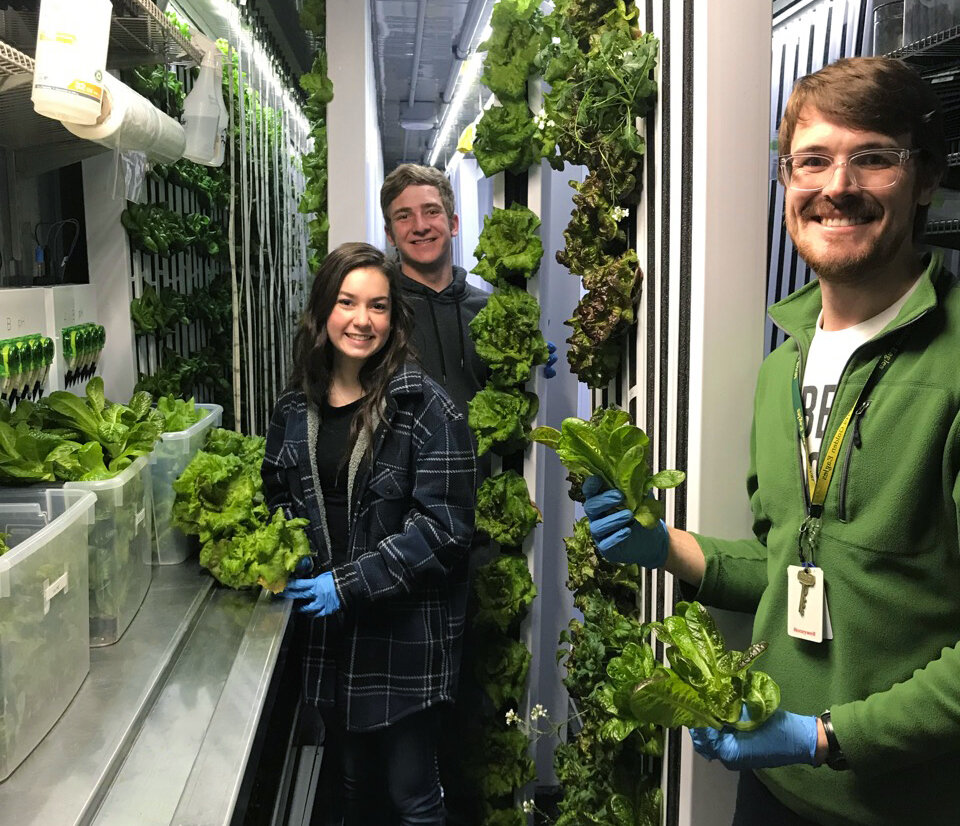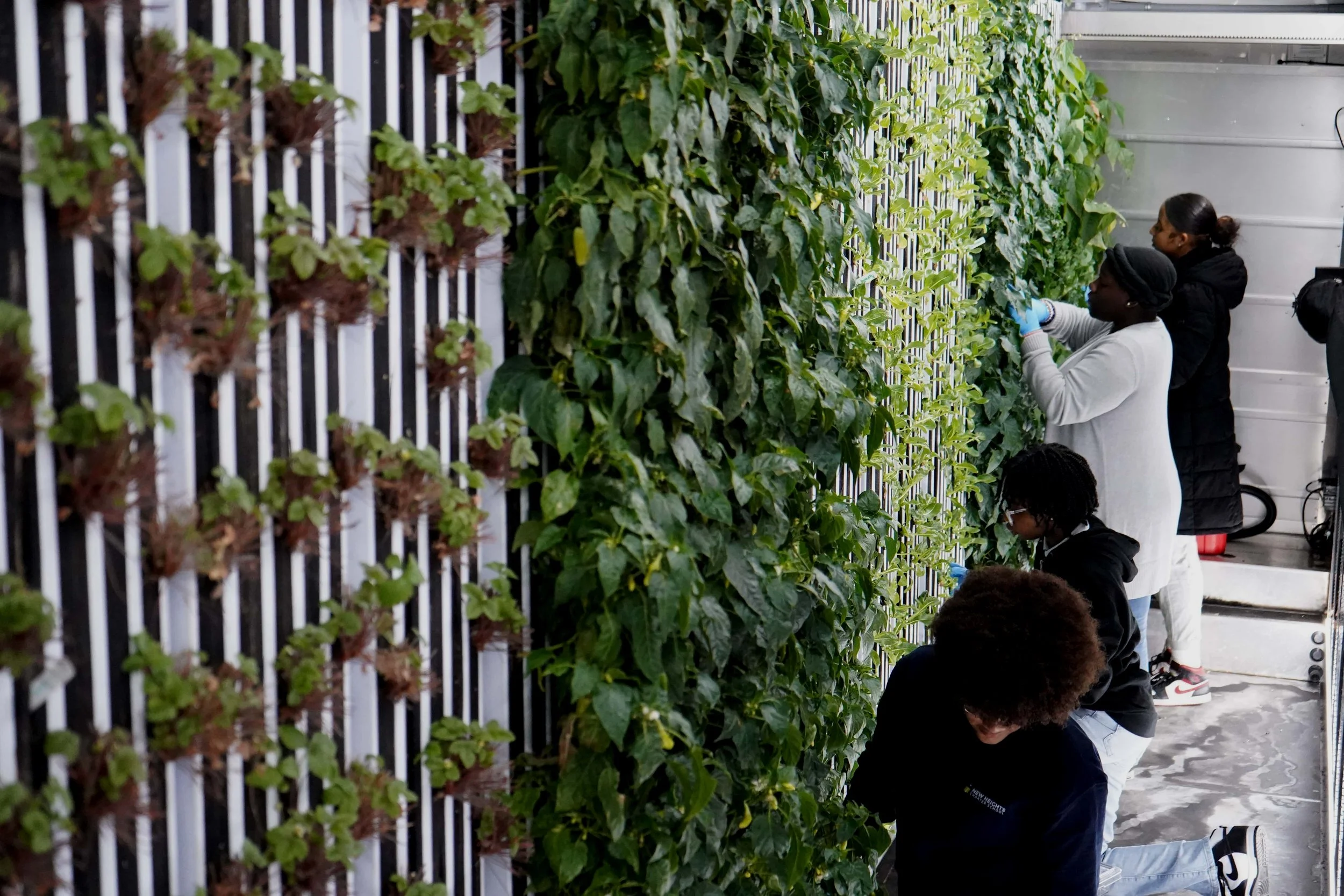Cafeterias, Classrooms & Clubs–A Farm for Every Occasion!
Container Farming at K-12 Schools
Whether it’s for an after-school club, a great school lunch, or a fun science class, more and more schools are adding farms to their school grounds. A popular option is a Freight Farms container farm, which is a great way to give kids hands-on experience and the cafeteria fresh greens the entire school year (most of which takes place outside the traditional growing period). Keep reading to see the creative ways five K-12 schools are using container farms!
Farming Career Development
Mountain Vista High School
Highlands Ranch, Colorado
The Mountain Vista farm is the cornerstone for a unique Agriculture Business course, which combines introductory business subjects with the hands-on experience of running a farm.
Here’s how the course is structured: students are introduced to a business concept in class. After grasping the principles, the students then apply the same concepts to operating the farm as a business. Students are responsible for the farm’s marketing, social media, website, communications, graphic design, printed literature, accounting, customer service, food safety, business plan development, and more.
The agricultural component of the course is equally important. Students are expected to operate the farm completely to keep the plants alive and healthy for sale, which includes figuring out all the environmental programming, taking care of the technology, tracking automation and data, and engineering any quick fixes in the farm.
Aside from the obvious learning opportunities, the Mountain Vista Agriculture Business course also teaches important ‘soft skills’, like punctuality, engagement, and responsibility that students can take with them to any job–agri-business related or not–in the future.
Source: Medium
Container Farming in Class
Rivers High School
Weston, Massachusetts
The Rivers Farm is conveniently located behind the school’s Math and Science Center, where it is easily accessible to all science classes, grades 6-12, who are using the farm in unique ways.
The sixth-grade science classes take care of the farm, sowing, transplanting, monitoring, and harvesting a variety of greens. The idea is to get students familiar with the farm for a variety of unique and hands-on classroom applications. The most comprehensive is a four-pronged cross-over Science and Humanities entrepreneurship project involving collecting supply and demand data for the cafeteria, coordinating donations to the Natick Service Council, starting up the May Farmers Market and a seed plug growing project for students to bring plants home for the summer to transplant into their garden.
Upperclassmen taking AP Environmental Science have their own use for the campus container farm. With a curriculum focused on sustainable agriculture, organic farming, and GMOs, the farm is an excellent example of sustainable farming. Each of the students creates an independent research project in the farm on the difference between organic and synthetic fertilizer, building their own research process and monitoring plant growth over time.
“Education is rapidly changing, and it is so important to develop and maintain a curriculum that is hands-on and relevant to today’s world.”
Container Farming Club
West Warwick High School
West Warwick, Rhode Island
West Warwick High School opened its Sodexo-operated container farm to curious students interested in learning about farm operations from seed to plate. The result is the “Leafy Green Club”, an extracurricular club consisting of several curious 10th graders. Not only do the students witness the entire 8-week growing cycle, but they can see firsthand how clean the hydroponic produce is: There is no dirt, no pesticides, just fresh leafy greens.
Another topic the West Warwick farm helps illustrate for students is reducing carbon footprint by producing food locally. Most lettuce comes from California, traveling approximately 2,800 miles to reach the East Coast. By comparison, the West Warwick farm is only 20 steps from the school kitchen. The message is clear. If every school and business with large-scale cafeteria grew a portion of their own food in a sustainable way, they could not only reduce their carbon footprint dramatically but also promote healthier eating for students and employees.
On top of capturing the imagination of high school students, the West Warwick container farm supplied about 14,000 heads of lettuce and some kale and basil to the school’s kitchen for the lunch program during the 2018-19 school year.
Cafeteria Supply
Cumberland High School
Cumberland, Rhode Island
The hydroponic container at Cumberland High School is a solution to a common problem at dining halls and cafeterias around the country: how can the school continue to serve students fresh vegetables all winter? The school’s foodservice provider, Sodexo, set out to find a solution and landed on the Freight Farms container farm.
The on-site farm allows the Cumberland dining staff to harvest and serve food within 24 hours. Everyone can tell the difference: the greens are brighter and more flavorful, all of which are good signs that the kids are getting food that is more nutritious. The ultimate goal is to involve students in the farm, with the hope that the farm can be used to teach students about sustainable growing and horticulture.
“If we pick something in the morning and a student is eating it for noontime, the nutrients are definitely right there. It’s the best way to consume produce that is locally grown.”
A Little Bit of Everything
IDEA Schools
San Antonio & San Benito, Texas
IDEA school is a network of tuition-free, pre-K-12 public charter schools around the country, and two Texas cities–San Antonio and San Benito–have added a hydroponic container farm to their school networks.
Both networks use the farms to grow food for their cafeterias and to engage and educate young students on the importance of eating healthy and growing food sustainably.
The San Antonio farm is the basis of an after school program for four students, certified as Junior Master Gardeners through a program that teaches kids gardening and cultivation best practices. Their goal is to become container farming experts by learning the entire process of growing IDEA’S food: planting the seeds, taking care of the seedlings, transplanting, and eventually harvesting greens for their fellow students.
Beyond just farming, the hydroponic container is an engaging space for IDEA students to learn about the future of growing food in the era of technology, combining several school subjects such as biology, chemistry, and math in a fun, hands-on environment. And if the IDEA farming program couldn’t get any better here’s one last tidbit: The IDEA cafeterias don’t give students access to salt or pepper, so the schools plans to use their container-grown herbs to make a seasoning mix that provides a healthier alternative to salt!
“The [farm] is teaching students about science, agriculture, and new technologies...but we also want them to think about where their food comes from, how it is grown, and why proper nutrition is essential to staying healthy for life.”
Interested in learning more about starting a similar container farming project at your school?
Check out all our resources! Plus, if you’re thinking of bringing a farm to a college campus, check out 5 Impactful Ways to Container Farm on Campus.















